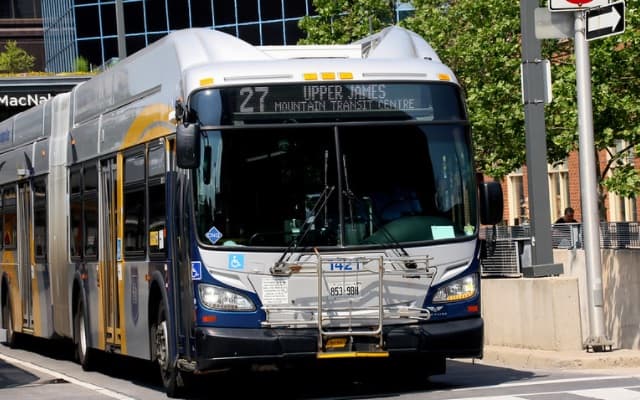Final transit contract offer ‘is reasonable and will not change,’ Hamilton mayor says
Published November 9, 2023 at 1:03 pm

As 880 transit workers began their strike today, the City of Hamilton stood firm on its final offer, saying it is “reasonable and will not change.” The Amalgamated Transit Union Local 107 had called the final offer “insulting” because it said it failed to keep pace with inflation.
Hamilton Mayor Andrea Horwath said council was unanimous in its support of the final offer so the “ball really is in the court of the union and the members.”
In explaining why a new collective agreement hasn’t been reached after 29 days of bargaining, Horwath told reporters today (Nov. 9) that it comes down to one issue.
“These negotiations are underpinned by facts we cannot change,” she said during a press conference Thursday morning. “It comes down to one thing … wages.”
However, the transit union disputes that, saying a key sticking point was also working conditions.
Horwath said the City’s final offer on wages addresses inflationary pressures and maintains Hamilton Street Railway workers’ position as the third-highest paid transit employees in comparable cities, behind Brampton and Mississauga.
The union’s requested wage increase of about 23 per cent over four years would translate to $17 million in wages, which would have to be covered by hikes in transit fares or property taxes, or both, Horwath said.
Horwath said the agreements struck with one union are used as the precedent for offers to other unionized staff. A 23-per-cent increase for all 11 unions would mean more than $113 million over the next four years.
The City’s final offer was a 12.75-per-cent increase over four years, which was similar to the deal struck in September with the City’s largest union, CUPE 5167, for inside and outside workers. Since the City is now at the bargaining table with six other unions, the transit deal would have an “important impact” on those negotiations, it said.
“It is consistent with our agreements with other unionized workers. City council is unwavering and unanimous … that it is fair .. reasonable and it cannot be increased without significant hardship on the people of Hamilton,” Horwath said. “We simply cannot put more costs on the people of Hamilton, not in this difficult moment in time.”
During the last transit strike in 1998, Horwath noted that it ended after 11 weeks.
She said Eric Tuck, who was a driver then and now head of the Amalgamated Transit Union Local 107, was quoted as saying it was the best deal workers would get under the circumstances.
“The City will do everything we can to reach a resolution to lessen the impact of disruption on the people of Hamilton,” said acting City Manager Carlyle Khan.
He said the city would be providing refunds on monthly transit pass holders and bulk ticket purchases. The City is working to manage parking and traffic to reduce the impact on those moving around the city, he added.
The City said it’s ready to go back to the table this afternoon if the union wants.
Talks between the parties ended on Tuesday. The City said the ATU Local 107 “refused to lower its requested wage increase and rejected a set of strike protocols.” Those protocols would have provided continued extended health and dental benefits to transit workers and their families during the work stoppage and established guidelines for safe and respectful strike behaviour, the City said.
Tuck previously called the final offer “insulting.” He said the union is fighting for a living wage that keeps pace with inflation. The union’s request for a four-per-cent wage increase is in line with what the City gave non-union staff, Tuck pointed out.
He said 1,100 non-union staff, such as managers and project managers, earn $120,000 to $160,000 a year and earlier this year received a four-per-cent base wage hike along with a market adjustment of up to an extra 11 per cent.
“By accepting another deal that fails to keep pace with inflation we are on the road to becoming the working poor, and that simply isn’t acceptable or fair,” Tuck said in a statement on Oct. 25.
In response to the non-unionized workers’ raises, the City said this morning (Nov. 9) that non-unionized workers are now paid at the 50th percentile, the middle of the salary range of comparable cities, pulling them up from the bottom half. As part of its retention strategy, the City said the recent wage increase for non-unionized employees reduced turnover rates to 5.23 per cent compared with 9.9 per cent last year. It said the largest increases were given to workers in non-management positions, such as receptionists, administrative assistants and clerks.
INthehammer's Editorial Standards and Policies




